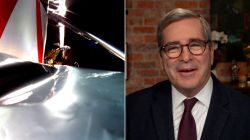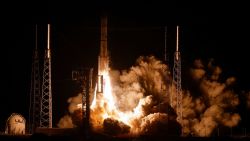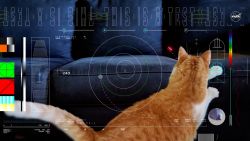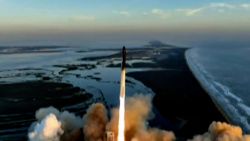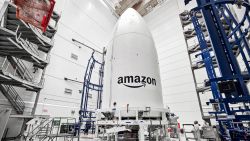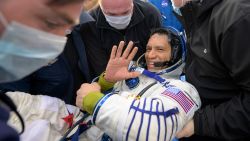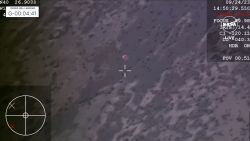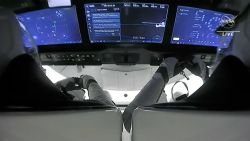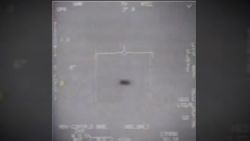Jeff Bezos’ rocket company, Blue Origin, became the subject of a federal review this fall after a group of 21 current and former employees co-signed an essay that raised serious questions about the safety of the company’s rockets — including the rocket making headlines for flying Bezos and other celebrities to space.
But that review was hamstrung by a lack of legal protections for whistleblowers in the commercial spaceflight industry, according to emails from Federal Aviation Administration investigators that were obtained by CNN Business.
The FAA also confirmed in a statement Friday that its Blue Origin review is now closed, saying the “FAA investigated the safety allegations made against Blue Origin’s human spaceflight program” and “found no specific safety issues.”
The emails obtained by CNN Business, however, reveal that investigators were not able to speak with any of the engineers who signed the letter anonymously. Investigators also were not able to go to Blue Origin and ask for documents or interviews with current employees or management, according to the FAA.
The situation highlights how commercial spaceflight companies like Blue Origin are operating in a regulatory bubble, insulated from much of the scrutiny other industries are put under. There are no federal whistleblower statues that would protect employees in the commercial space industry if they aid FAA investigators, according to the agency.
The commercial space industry is in a legally designated “learning period” until at least October 2023 — a “learning period” that has been extended several times, most recently by a 2015 law called the Commercial Space Launch Competitiveness Act. The idea is to allow the industry to mature and give companies a chance to self-regulate without overbearing government interference. But that designation effectively bars federal regulators from implementing certain new rules or wielding the same oversight powers for commercial space companies as it does for aviation.
That meant that investigators had to rely on current and former Blue Origin employees voluntarily coming forward to offer information.
But “no technical experts have reached out to us or provided any specific documentation regarding the safety allegations. We understand that there are no federal ‘whistleblower protection’ statutes protecting employees of commercial space companies from retaliation resulting from reporting safety issues,” reads one email from FAA investigators that was sent to Alexandra Abrams, who was the only of the essay’s signatories to go on-the-record and says she has been running point on the review, on Monday.
“This is in stark contrast to the extensive protections available to commercial aviation industry whistleblowers. We believe this was an enormous factor in our inability to pursue this investigation further,” the email continued.
“[T]he FAA could not investigate this matter in depth, and thus, could not substantiate the safety concerns described in the document you provided. No further actions can be recommended at this time,” the email states.
Abrams — who was employed with the company for two and a half years, during which she had a stint in public relations before establishing the company’s department of employee communications before she was fired in 2019 — told CNN Business that current and former employees that she keeps in touch with have expressed grave concerns about the future of their careers if they agreed to cooperate with investigators.
In one email to investigators, Abrams writes that some employees “fear bodily harm, loss of livelihoods and careers, humiliation” and being targeted by Bezos.
She also shares a text exchange with a Blue Origin engineer who had planned to provide an anonymous written statement to the FAA but later changed their mind, fearing that the statement could be traced back to its source. The engineer adds that they “hope other people…speak up and say something,” according to a redacted screenshot of the text exchange.
That pattern continued for weeks in discussions with more than a dozen current and former employees, Abrams said.
“[U]nfortunately, without speaking to anyone or having the ability to review documentation, our hands are tied,” one FAA investigator writes in a separate email to Abrams sent November 3.
Blue Origin has routinely said that safety is the company’s top priority, and according to the company, there have not been any major issues with its two crewed flights, one of which flew Bezos to space in July, or more than a dozen uncrewed test missions flown over the past several years.
The company did not immediately respond to a request for comment.
Blue’s whistleblowers
The 2,200-word essay was published in September by Lioness, which works with whistle blowers and agreed to represent the signatories pro bono. In it, the 21 signatories — most of whom spent at least two years at the company and include senior engineers and managers who have worked across a variety of departments and programs, according to a list of the signatories reviewed by CNN Business — speak out against what they describe as a toxic workplace where “professional dissent” is “actively stifled.”
In a statement responding to the essay, Blue Origin said it has “no tolerance for discrimination or harassment of any kind. We provide numerous avenues for employees, including a 24/7 anonymous hotline, and will promptly investigate any new claims of misconduct.” The company did not respond to requests for comment about specific allegations in the essay.
Though every rocket launch is inherently risky because of the sheer complexity and power of the vehicles involved, some engineers at the company have also pushed back against what they saw as a desire to put speed over safety, according to the essay and internal documents. One senior engineer, for example, resigned in April 2020 to protest a “‘schedule-biased drive [that] is incapable of producing safe systems engineering.”
“In this environment, safety is not an option, even if we repeatedly state that it is our highest priority,” the resignation letter, obtained by CNN Business, reads.
The essay published in September also states that many of its authors “say they would not fly on a Blue Origin vehicle.”
The FAA said in a statement at the time that it “takes every safety allegation seriously, and the agency is reviewing the information.”
But that statement belied a lack of authority the agency had to research or corroborate the claims in the essay.
“In most cases, the FAA is explicitly prohibited from issuing regulations to protect the health and safety of humans aboard commercial spacecraft,” reads an October 2021 synopsis on the legal framework from the Congressional Research Service.
Instead, current law “takes an informed consent approach. Operators must notify spaceflight participants (i.e., occupants who are neither government astronauts nor crew employed by the operator) about the risks of launch and reentry and inform them in writing that the U.S. government has not certified their spacecraft as safe,” the document states.



